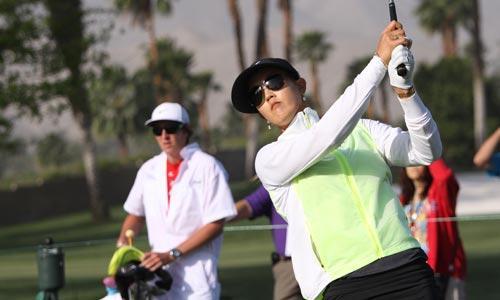Wie’s Mental Toughness
Michelle Wie won her first U.S. Women’s Open last Sunday, but not without more tension than Kaymer’s nine-shot victory the week before.
After making a double on the 16th hole, Wie stated she was shaken. “It was pretty scary. I gave myself a nice heart attack,” Wie said. “I think I aged about 10 years in a span of 15 minutes there.”
After the win, she admitted, when she was 15 years old, she’d try to drive the green on the first hole of a tournament…
However, she’s learned since then…
On Sunday, “I spent a lot of time before I came out this morning figuring out a game plan and I was really happy, I was really proud of myself for sticking with it,” Wie said.
“I think the fact that I struggled so much, the fact that I kind of went through a hard period of my life, the fact that this trophy is right next to me, it means so much more to me than it ever would have when I was 15,” Wie said.
What are the biggest mental game lessons Wie learned?
Lesson #1: Stay in the Present.
Not thinking about the trophy in your hands when you are trying to win your first US Open–or any tournament–is very difficult. After making double on 16, she said, “I think that I felt a tinge of panic. I would be lying if I would say I was calm and collected.”
Lesson #2: Don’t be a Perfectionist.
“I just wanted to control everything. Have the perfect swing. Have the perfect putting stroke. And if something wasn’t perfect, then I would start to freak out.” Wie said that she decided to let go of it, have fun, and focus on improving every day. “I think over the years I started to learn, notice, that you can’t be perfect.”
Lesson #3: Shut Down the Doubt.
“Oh, my God, I’m going to make a triple. I’m going to make a quadruple. What’s going to happen? I’m going to lose the U.S. Open. I just shut that off. And I’m just really proud of myself for being able to do that,” said Wie after the final round.
Lesson #4: Stay Patient with Improvement.
At the highest level in the game, improvement can be slow and sometimes had to perceive. That’s when doubt can kick in. “I just got down on myself when I didn’t see it [improvement]. When I was in doubt, and my parents never let me doubt myself.”
Any golfer who has struggled at one time in his or her career has a lot to learn from Michelle Wie. She was under a lot of pressure very early in her golf career when the media hailed her as the “Tiger Woods of women’s golf.”
She learned a lot about herself and how to win in the process. Her mental game lessons for success are important for any level golfer; lessons at the core of mental toughness.
Improve your mental toughness with one-on-one mental coaching with Dr. Cohn.
Related Sports Psychology Articles
- Mental Toughness as an Underdog
- Mental Toughness Tips for Athletes
- The Importance of Mental Toughness
*Subscribe to The Sports Psychology Podcast on iTunes
*Subscribe to The Sports Psychology Podcast on Spotify
Download a free sports psychology report to improve your mental game!
Learn more about our one-on-one mental game coaching.
Golfer’s Mental Edge

What’s the big sign that your mental game is the weak link in your golf game? When you can’t play consistently as well as when you play a practice or casual round–or your range game is way better than your game on the course. If you suffer from lack of focus, low self-confidence, poor composure or other mental game obstacles on the course, you can’t reach your true potential in golf.
The Golfer’s Mental Edge 2.0 Audio and Workbook program is ideal for any amateur, collegiate, junior, and tour professional golfer.
Golf coaches and instructors would also be wise to teach “The Golfer’s Mental Edge 2.0” principles to their players. This program is perfect for any golfer who wants to improve performance and consistency by managing their mind better on the course.

